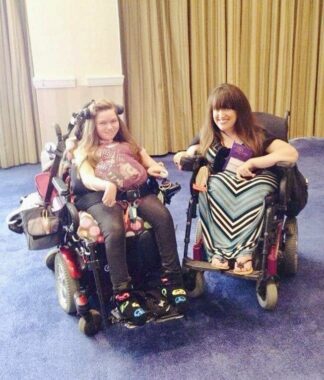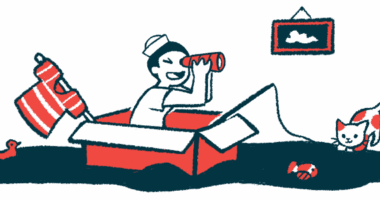Advice from a mentor to many who are living with SMA

If you haven’t met this celebrity of the SMA community, I’d like to introduce you to my friend Angela Wrigglesworth-Titcombe. She’s 46 years old, has SMA, and is a fifth-grade teacher. She and her husband of six years, Justin, love to travel and enjoy Mexican food.
Angela’s students aren’t the only kids who look up to her. She’s also been a mentor to many children living with SMA.
In fact, that’s how I met her. She was leading a workshop for kids with SMA at the first conference my family attended through Families of Spinal Muscular Atrophy, which later became Cure SMA. Her warm, encouraging personality made her instantly likable, and she became a trusted role model on wheels. I looked to her for wisdom on navigating the stages of life — from childhood to adulthood — with this condition that we share.
Along with many others, I still lean on the wisdom imparted to me in my childhood and teenage years by our community’s invaluable leaders and mentors like Angela. She’s agreed to share some of her experiences and guidance with me. Excerpts of our recent email exchange follow.
HB: How did you become involved with Cure SMA and speaking to kids at the conference?
AWT: I was Ms. Wheelchair Texas 2004 and attended my first Cure SMA [then called Families of Spinal Muscular Atrophy] conference that year to serve on the “It’s a Wonderful Life” panel. The following year, Al Freedman invited me to work with him in the “Kids Talk It Out” sessions, and I’ve been involved ever since.
What’s the most fulfilling part of mentoring the SMA community’s younger generations?
Moments like this when I get to see the young people I once worked with in a session grow up to be successful adults like you, Halsey.
What have these kids taught you?
I’ve learned so much from the kids. Tips and tricks on navigating life that I never would’ve thought of. I’ve applied so many of their coping skills in coaching my own students through adverse situations.
What’s it been like to watch many kids you’ve met at conferences grow into adults?
The most exciting part is that SMA is no longer a pediatric disease. Young people are living and thriving in adulthood, and seeing that shift in the disease process is beyond exciting.
What advice would you give to a young person with SMA?
I like to think of giving advice as telling my younger self the things I wish I’d known.
• Make physical therapy a part of your life forever and prioritize it.
• Bring caregivers into your home as soon as possible to give your mom and dad a chance to take a needed break.
• Don’t be afraid to travel.
• Be confident in all situations.
Is there anything else you’d like to add?
Learning to ask for help is an art form, one that must be mastered if you want to live a successful, independent life with SMA.
***

Halsey Blocher, left, and Angela Wrigglesworth-Titcombe attend the 2014 Cure SMA conference in Washington, D.C. They’re still friends a decade later. (Courtesy of Halsey Blocher)
I distinctly remember the conference sessions I attended when I was younger, where groups of kids in wheelchairs gathered in a circle around Angela, captivated by her stories and advice, which are echoed in what she’s shared in this interview.
The conversations we had in those hotel conference rooms are something we took to heart and carried with us through life. Each of us went on to find our own path, chase our own dreams, and build lifestyles that suit our individual needs and desires. And Angela has been cheering for all of us on our unique journeys.
For me, the best part about Angela’s words of wisdom is that they helped build a foundation for a relationship that grew into a cherished, longtime friendship.
At their heart, that’s what I think those sessions are about. They’re spaces where all sorts of beautiful people can come together to learn grow, have fun, and bond. Many of those bonds blossom into friendships that last long after everyone goes home at the conference’s end.
I’d like to thank you, Angela, for taking the time to thoughtfully answer my questions, for all your contributions to our community, and for your investment in so many different, outstanding people.
If you’d like to catch up with Angela or meet her for the first time, you can find her at this year’s Cure SMA conference in Austin, Texas, June 6-9. Preregistration for the conference has closed, but if you’re interested in attending, please contact Cure SMA at [email protected] to inquire about on-site registration.
Note: SMA News Today is strictly a news and information website about the disease. It does not provide medical advice, diagnosis, or treatment. This content is not intended to be a substitute for professional medical advice, diagnosis, or treatment. Always seek the advice of your physician or other qualified health provider with any questions you may have regarding a medical condition. Never disregard professional medical advice or delay in seeking it because of something you have read on this website. The opinions expressed in this column are not those of SMA News Today or its parent company, BioNews, and are intended to spark discussion about issues pertaining to spinal muscular atrophy.
The post Advice from a mentor to many who are living with SMA appeared first on SMA News Today.




